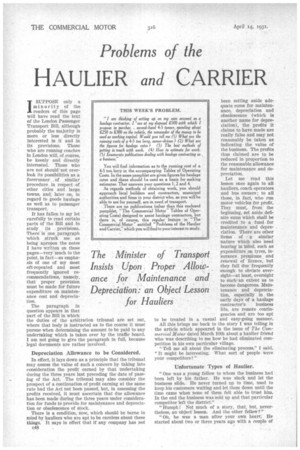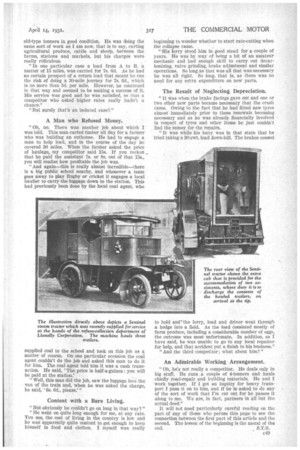Problems of the
Page 70

Page 71

If you've noticed an error in this article please click here to report it so we can fix it.
HAULIER and CARRIER ISUPPOSE only a minority of the readers of this page will have read the text of the London Passenger Transport Bill, although probably the majority is more or less directly interested in it and in its provisions. Those who are running coaches In London will, of course, be keenly and directly interested. Those who are not should'not overlook its possibilities as .a forerunner of similar procedure in respect of other cities and large towns, and, later on, in regard to goods haulage as well as to passenger transport.
It has fallen to my lot carefully to read certain parts of the Bill and to study its provisions. Thereis one paragraph which struck me as being apropos the notes I have written on these pages—very much to the point, in fact—as emphasis of one of my most oft-repeated and most frequently ignored recommendations, namely, that proper provision must be made for future expenditure on maintenance cost and depreciation.
The paragraph in question appears in that part of the Bill in which the duties of the arbitration tribunal are set out, where that body is instructed as to the course it must pursue when determining the amount to be paid to any undertaking which is taken over by the traffic board. I am not going to give the paragraph in full, because legal documents are rather involved.
Depreciation Allowance to be Considered.
In effect, it lays down as a principle that the tribunal may assess the value of such a concern by taking into consideration the profit earned by that undertaking during the three years last preceding the date of pass . ing of the Act. The tribunal may also consider the prospect of a continuation of profit earning at the same rate had the Act not been passed, but, in assessing the profits received, it must ascertain that due allowance has been made during the three years under consideration for funds to provide for maintenance and depreciation or obsolescence of stock.
There is a condition, now, which should be borne in mind by hauliers who are apt to be careless about these things. It says in effect that if any company has not c48 been setting aside adequate. sums for maintenance, depreciation and obsolescence (which is another name for depreciation), the profits it claims to have made are really false and may not reasonably be taken as indicating the value of the business. The profits thus claimed are to be reduced in proportion to the reasonable allowance for maintenance and depreciation.
Let me read this lesson once again to all hauliers, coach operators and bus owners ; to all those, in fact, who run motor vehicles for profit. They must, from the beginning, set aside definite sums which shall be credited to a fund for maintenance and depreciation. There' are other itemsof a similar nature which also need bearing in mind, such as _expenditure pn tyres, insurance premiums and renewal of licence, but they fall due frequently enough to obviate oversight—at least, oversight to such an extent as to become dangerous. Maintenance and depreciation, especially in the early days of a haulage contractor's business life, are remote contingencies and are too apt to be treated in a casual and easy-going manner.
All this brings me back to the story I was telling in the article which appeared in the issue of The Commercial Motor dated March 10th about a haulier friend who was describing to me how he had eliminated competition in his own particular village.
"Tell me all about the eliminating process," I said. " It might be interesting. What sort of people were your competitors?"
Unfortunate Types of Haulier.
"One was a young fellow to whom the business had been left by his father. He was slack and let the business slide. He never turned up to time, used to keep his customers waiting and let them down until the time came when none of them felt able to trust him. In the end the business was sold up and that particular competitor left the district."
"Humph ! Not much of a story, that, but, nevertheless, an object lesson. And the other fellow?"
"Oh,he was a man after your own heart. He started about two or three years ago with a couple of old-type tonners in good condition. He was doing the same sort of work as I am now, that is to say, carting agricultural produce, cattle and sheep, between the farms, stations and markets, but his charges were really ridiculous.
"In one particular case a load from A to B, a matter of 15 miles, was carried for 7s. 6d. As he had no certain prospect of a return load that meant he ran the risk of doing a 30-mile journey for 7s. fid., which is no more than 3d. per mile. However, he continued in that way and seemed to be making a success of it. His service was good and he was _satisfied, so that a competitor who asked higher rates really hadn't a chance."
"But surely that's an isolated case?"
A Man who Refused Money.
"Oh, no. There was another job about which I was told. This man carted timber all day for a farmer who was building an outhouse. He had to engage a man to help load, and in the course of the day he covered 30 miles. When the farther asked the price of haulage, my competitor said 15s. If you reckon that he paid the assistant 75. or Ss. out of that 15s., you will realize how profitable the job was.
"And again—this is really almost incredible—there is a big public school nearby, and whenever a team goes away to play Rugby or cricket it engages a local haulier to carry the luggage down to the station. This had previously been done by the local coal agent, who supplied coal to the school_ and took on this job as a matter of course. On one particular occasion the coal agent couldn't do the job and asked this man to do it for him. The coal agent told him it was a cash transaction. He said, 'The price is half-a-guinea : you will be paid at the station.'
"Well, this man did the job, saw the luggage into the van of the train and, when he was asked the charge, he said, 'Cs. fid., please.'"
Content with a Bare Living.
" But obviously he couldn't go on long in that way?" "He went on quite long enough for me, at any rate. You see, the cost of living in the country is low and he was apparently quite content to get enough to keep himself in food and clothes. I myself was really beginning to wonder whether to start rate-cutting when the collapse came. "His lorry stood him in good stead for a couple of years. He was by way of being a bit of an amateur mechanic and had enough skill to carry out decarbonizing, valve grinding, brake adjustment and similar operations. So long as that was all that was necessary he was all right. So long, that is, as there was no need for any extra expenditure on new parts.
The Result of Neglecting Depreciation.
"It was when the brake facings gave out and one or two other new parts became necessary that the crash came. Owing to the fact that he had fitted new tyres almost immediately prior to these renewals becoming necessary and as he was already financially involved in respect of tyres and other items he just couldn't find the money for the repairs.
"It was while his lorry was in that state that he tried taking a 30-cwt. load down-hill. The brakes ceased to hold and the lorry, load and driver went through a hedge into a field. As the load consisted mostly of farm produce, including a considerable number of eggs, the outcome was most unfortunate. In addition, as I have said, he was unable to go to any local repairer for help, and that accident put a finish to his business."
"And the third competitor ; what about him? "
An Admirable Working Arrangement.
"Oh, he's not really a competitor. He deals only in big stuff. He runs a couple of 4-tonners and hauls chiefly road-repair and building materials. He and I work together. If I get an inquiry for heavy transport I pass it on to him, and if he is asked to do any of the sort of work that I'm cut out for he passes it along to me. We are, in fact, partners in all but the actual deed."
It will not need particularly careful reading• on the part of any of those who peruse this page to see the connection between the first part of this article and the second. The lesson of the beginning is the moral of the end. S.T.R.












































































































